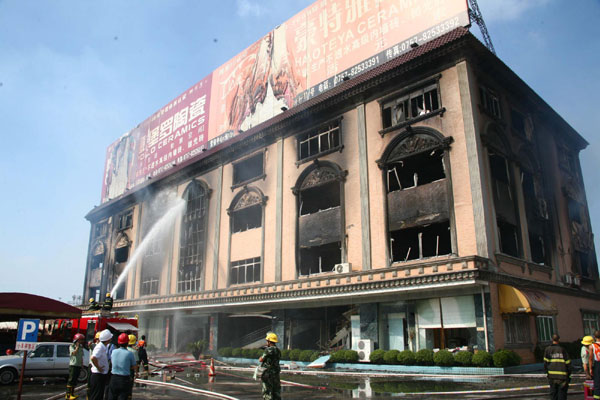Society
- Details
- By David Cao
- Hits: 1099
China will draft a new national program for human rights development for the period from 2012 to 2015 to improve people's basic rights, said Wang Chen, minister of the State Council Information Office, on Thursday.
The new national human rights action plan, the second of its type in China, will set up detailed goals and measures related to people's rights in sectors including employment, social security, health and education, Wang said at a two-day seminar in Beijing.
The first such action plan for 2009 to 2010 has been fully implemented, with all tasks completed, he said.
- Details
- By David Cao
- Hits: 964

Firefighters put out a fire at a ceramics factory in Foshan, South China's Guangdong province, Aug 23, 2011. The fire in the four-storey building in the Shengfeng Ceramics Company in the city killed 15 people and injured two others on Tuesday morning. The cause of the fire is under investigation.
A fire at a ceramics factory killed 15 people and seriously injured one Tuesday morning in south China's Guangdong Province, local authorities said.
The fire broke out at 6:18 am, engulfing a building of the Shengfeng Ceramics Company in Sanshui District in the city of Foshan, said Sun Jiangmin, an official with the provincial fire department.
Among the casualties, 12 were killed in the fire and one died later in a hospital. Another two died after jumping from the four-story building, said Sun.
- Details
- By David Cao
- Hits: 767
With China blaming recent attacks in Xinjiang on extremists trained in Pakistan-based terror camps, Islamabad has promised to help its all-weather ally fight Uyghur militants in the far-western frontier region and proposed "integrated border management" to address the issue.Pakistan and China are "entwined so closely that any move to hurt China's security in Xinjiang hurts us simultaneously," Pakistan's Ambassador to Beijing Masood Khan told a seminar here yesterday. "Our two countries will continue to fight the ETIM, (East Turkistan Islamic Movement). Our solidarity in this regard is rock solid. No country or force can drive a wedge between us," he said, according to Pakistan's state-run APP news agency. Khan's comments came against the backdrop of allegations by the municipal government in Kashghar in Xinjiang that leaders of ETIM who carried out the attacks in the city close to Pakistan-occupied Kashmir (PoK) last month were trained in terror camps in Pakistan.This was the first allegation by China in the five-decade long strategic ties between the two countries and was seen as open expression of China's disappointment in Pakistan's efforts to help it contain separatist ETIM militants in Xinjiang, home to Muslim Uyghur community. Khan, in his address, also proposed "integrated development" of borders. Xinjiang borders Pakistan-occupied Kashmir (PoK) and Pakistan wants establishment of special economic zone (SEZ) to develop the area. "China's policy of developing its Western region, especially Xinjiang, offers a historic opportunity for bringing Pakistan and China even closer and using Kashgar and Khorgos as launching pads for the modern day Silk Road," Khan said.
- Details
- By David Cao
- Hits: 740
WHILE the downgrade of United States government debt by Standard & Poor's shocked global financial markets, China has more reason to worry than most: the bulk of its $US3.2 trillion ($A3 trillion) in official foreign reserves - more than 60 per cent - is in dollars, including $US1.1 trillion in US Treasury bonds.
So long as the US government does not default, whatever losses China may experience from the downgrade will be small. To be sure, the US dollar's value will fall, imposing a balance-sheet loss on the People's Bank of China (the central bank). But a falling dollar would make it cheaper for Chinese consumers and companies to buy American goods. If prices are stable in the US, as is the case now, the gains from buying American goods should exactly offset the PBC's balance-sheet losses.
Read more: Structural adjustment needed to cure China's $3 trillion headache
- Details
- By David Cao
- Hits: 827
BlueScope Steel Ltd. (BSL), Australia’s largest steelmaker that today reported A$1 billion ($1 billion) full-year loss, aims to raise output capacity in China by 33 percent to tap demand in the world’s biggest consumer.
“We have a business in China that’s going from strength to strength,” Paul O’Malley, chief executive officer of the Melbourne-based company, said today in an interview. “We’re building a new facility in Xi’an so that we can actually participate in the growth in Western China. I would say over the next few years we will look to add another facility.”
Read more: BlueScope to Raise Steel Capacity in China 33% to Meet Demand
More Articles …
Page 71 of 255